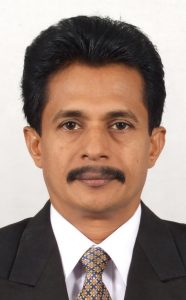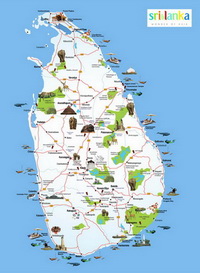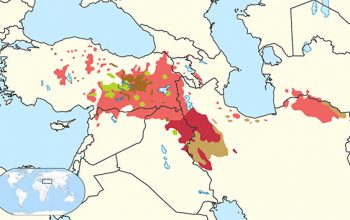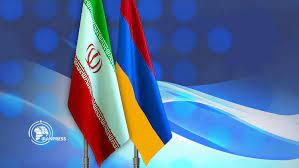
Prof. Jayasekara J.S.K., PhD, Journalism, Grand PhD
INTRODUCTON
Then known as Ceylon, lying in the Indian Ocean, separated from the peninsular India by Palk Strait, also known as Granary in the East and Pearl in the Indian Ocean, is none other than my motherland, SRI LANKA.
This island was once under the Portuguese, Dutch and finally, under the British rule, known as the British Crown Colony of Ceylon and gained independence as a result of tremendous struggles, in the year 1948, although it remained under dominion status. Its 1972 constitution proclaimed it as an independent republic and changed the country’s name. Finally, in 1978, a new constitution officially declared the island as the Democratic Socialist Republic of Sri Lanka.
Sri Lanka has a great pride of having a history dating back over 3000 years, with evidence of pre-historic human settlements dating back to at least 125,000 years. It is blessed with an excellent geographic location with deep harbors and this made her an effectively active hub from the time of the ancient Silk Road through the Second World War. Also, Sri Lanka’s recent history has been marred by a 30 year civil war which decisively ended when the Sri Lankan Military defeated the Liberation of Tamil Tigers of Tamil Eelam in 2009.
Since then, Politics, media and journalism has always been a subject interacting very often with the people, in both national and international levels, providing information and updates on every era that has been passed by.
OVERVIEW OF MEDIA AND JOURNALISM IN SRI LANKA
Media of Sri Lanka has always been people-friendly, communicating with them effectively and efficiently throughout every incident, trustworthily.
The media in Sri Lanka can be broadly placed into two categories- those which are owned and controlled by the State and those which are privately owned and controlled, and consists of different types of communication media, such as television, radio, newspapers, magazines and the websites. State and private media operators provide services in the main languages, Sinhala, Tamil and English.
The state owns the Associated Newspapers of Ceylon Ltd. (Lake House) which has the broadest outreach in terms of distribution networks, and which also benefits from extensive State Advertising. Radio and Television were a government monopoly until the mid 1980s. Since then several privately owned television/radio stations have been established. The State continues to control the Sri Lanka Broadcasting Corporation (radio), the Sri Lanka Rupawahini Corporation (television) and ITN radio and television network. The transmission capacities of the Private stations are much more limited than that of the State owned radio and television. Thus, State radio and television remain the electronic Medias that reach the largest number of consumers, especially in far-flung areas of the island.
There are several journalists’ organizations that work for the promotion of their profession. Few among them are the Free Media Movement, Working Journalists’ Association and the Photo-Journalists Association, Editors’ Guild of Sri Lanka, and a Foreign Correspondents’ Association. There are number of trade unions of media workers and the Federation of Media Employee Trade Union (FMETU), which unites all of them. The most active organization in Sri Lanka that advocates and lobbies for the freedom of expression and information is The Free Media Movement (FMM), a grouping of independent journalists and the persons working in different fields in the media.
MASS MEDIA
Media bias is the bias or perceived bias of journalists and news producers within the mass media in the selection of events and stories that are reported and how they are covered. The term “media bias” implies a pervasive or widespread bias contravening the standards of journalism, rather than the perspective of an individual journalist or article. The direction and degree of media bias in various countries is widely disputed.
POLITICS AND JOURNALISM
Politics and Journalism has always been a prominent topic when it comes to governing a country and since then, the society has always shown the curious interconnection between them, as there has been a mysterious interconnection between them since a very long time. Many struggled and wished to stay at one end of both ropes, but such attempts seemed futile while some people have crossed the boundary, dangling both paths more than once. So, It is rather obvious that there is a clear firewall between the two professions.
In a nutshell, the nexus between journalism and politics is divergent. Thus, there has been a growing case of symbiotic relationship between the two. For better outcome, all concerned parties need to define their responsibilities and maintain their niche without transgressing same.
Political journalism is a broad branch of journalism that includes coverage of all aspects of politics and political science, although the term usually refers specifically to coverage of civil governments and political power.
Political journalism is a frequent subject of opinion journalism, as current political events are analyzed, interpreted, and discussed by news media pundits and editorialists.
Subsets are as follows:
• Election journalism or electoral journalism is a subgenre of political journalism which focuses upon and analyzes developments related to an approximate election and political campaigns. This subgenre makes use of statistics, polls and historic data in regards to a candidate’s chance of success for office, or a party’s change in size in a legislature.
• Defense journalism or military journalism is a subgenre which focuses upon the current status of a nation’s military, intelligence and other defense-related faculties. Interest in defense journalism tends to increase during times of violent conflict, with military leaders being the primary actors.
Journalism is the key route in providing ideas, both, negative and positive into a consumers mind. Most of the people rely exactly on the media as it is the mediator in providing news related to politics, as it is discussed here. Hence, journalists have an immense responsibility in transmitting the exactly accurate relevant news to the public.
A very prominent point to emphasize is that media and journalism should be unbiased to the core. The officials responsible, from the top to the bottom should have an idea that they are handling a great big responsibility and should work avoiding any attempts to obtain bribe and should be fearless of the threatening that may come across or any other convincing. Mediators should not be hesitant to speak out the truth.
According to the information I collected upon my researches, a very unfortunate situation in the present is, the politicians often misusing their power. Many incidents are reported that the politicians offer bribes and handle the media units as their own property, almost buying the entire network, if simply said. They make the media units transmit their own supporting programs and news, avoiding any illegal acts performed or hiding the truth. This can be very disastrous as it fools the consumers, breaking their trust on the media and providing fraud/false information.
Hence, it is a major responsibility of the media units to be unbiased and to be fearless, straightforward.
JOURNALISM ETHICS AND STANDARDS
Also known as “Canons of Journalism” it comprises of the set of code of ethics or rules that a journalist should adhere to, by professional journalism associations and individual print, broadcast and online news organizations. Most common elements include truthfulness, accuracy, objectivity, timeliness, impartiality, fairness and public accountability, etc.
A very important ethic which should definitely be followed by the journalists is the ethic, “Limitation of Harm.” This includes the withholding of certain details from reports such as the names of minor children, crime victims’ names or information not materially related to particular news report release of which might harm someone’s reputation.
Taste, decency and acceptability also play a major role when it comes to ethics and standards. Audiences have different reactions to depictions of violence, nudity, coarse language, or to people in any other situation that is unacceptable to or stigmatized by the local culture or laws.
When certain distasteful or shocking material is considered important to the story, there are a variety of common methods for mitigating negative audience reaction. Advance warning of explicit or disturbing material may allow listeners or readers to avoid content they would rather not be exposed to. Offensive words may be partially obscured or bleeped. Potentially offensive images may be blurred or narrowly cropped. Descriptions may be substituted for pictures; graphic detail might be omitted. Disturbing content might be moved from a cover to an inside page, or from daytime to late evening, when children are less likely to be watching. The above ethics play a major role while communicating with the world.
SKILLS AND ABILITIES OF A J OURNALIST
Top-notch communication skills are mandatory for journalists. Polished verbal communication skills and perfect written communication skills to demonstrate with excellent grammar and spellings are the key roots in communicating effectively and accurately.
Journalists spend a lot of time researching subjects using a wide range of sources, so knowledge of electronic databases and archiving system is helpful. Practice in using the modern technology such as computer software, cameras and recorders can make the job easier.
Quick thinking skills, adopting to new situations, being comfortable with the people, ability to conduct interviews, being patient when dealing with different personalities, politeness, logic, ability to judge a potential story using critical thinking skills, etc can be considered as a few essential abilities a proper qualified journalist should possess.
JOURNALISM IN SRI LANKA
But, it is very unfortunate to say that when it comes to online media such as e-newspapers and other news websites in Sri Lanka, we may often come across situations where neither censoring graphics nor abusive/unsuitable language is made. Or simply, where the code of ethics is not followed to the dot.
This may be caused due to the lack of knowledge of the green journalists, new to the field, who have not been through the codes of ethics and other necessary requirements to become a journalist. It is sad to say that most of the so called “Journalists” have no proper picture on how journalism works and the responsibilities of it. Improper handling of journalism can lead to destructive results.
IMPROVING JOURNALISM
The following can be considered as key factors to improve the skills in journalism, to become a successful journalist:
• Multimedia storytelling skills – Producing slideshows with sound, shooting and editing video and photos, writing for the web.
• Data and statistical skills for storytelling. Collecting, editing, analyzing and interpreting data to produce compelling interactive maps and graphics.
• Audience development skills (formerly known as marketing and circulation) such as managing online communities, interpreting data on audience behavior, crowd sourcing for information, interacting with the audience.
• Basics of programming. How to create compelling pages that attract web audiences.
• The business of media. Journalists can help a news organization generate revenues without compromising their ethics, and today that skill is more important than ever.
• Tight writing. The ultimate aim of journalism should be to tell a story as clearly and concisely as possible. It should be short, sweet and to the point.
IMPACT OF SOCIAL MEDIA ON JOURNALISM
With the growing use of social media to report news the consumer perception of real time news is changing – people now expect to receive news instantaneously and expect constant updates of developments. This is significantly influencing the direction and practice of journalism. The availability of these online blogs and social media networks has changed the way that journalists are able to operate and it can be a valuable tool aiding journalists in their newsgathering, audience engagement and it can act as another platform for content.
It is important to note that social media and blogs are not replacing journalism, but they are adding another layer of information to existing news sources. One key way that social media has changed how journalists approach the news is through helping journalists in newsgathering and crowd sourcing. This has helped them to collect more material on news stories and has provided access to a wider range of voices that are able to tell their own stories and opinions on the matter.
Social media also helps journalists to source eyewitnesses quickly, as people are keen to tweet or post about interesting things they have witnessed to tell their friends about what they saw. This can be a significant benefit making it easier for journalists to track down those who might have a first-hand account of an event.
WATCHDOG JOURNALISM
Watchdog journalism informs the public about goings-on in institutions and society, especially in circumstances where a significant portion of the public would demand changes in response. This might involve:
• Fact-checking statements of public officials
• Interviewing public figures and challenging them with problems or concerns
• Beat reporting to gather information from meetings members of the public might not otherwise attend, and to observe “on the ground” in broader society
• Investigative journalism, which involves information-gathering on a single story for a long period of time
Like a literal guard dog that barks when it notices an intruder, a “watchdog” role involves alerting others when a problem is detected. Common subjects are the government decision-making process, illegal activity, immorality, consumer protection issues, and environmental degradation.
Watchdog journalism can be located in a variety of news media, such as radio, television, Internet, and print media where it may be seen as “a unique strength of newspapers”, and additional new media and concepts such as weblogs and citizen journalism. Watchdog journalists also are called “watchmen”, “agents of social control”, or “moral guardians”.
Hence, considering all the knowledge I’ve gathered so far and on what’s mentioned above, wish to conclude that Politics, Media and Journalism are the three roots of communication, which are interrelated and play a major role in the society globally, to obtain an understanding on the country’s situation, its progress, the governing party’s strengths, weaknesses, and hence can be used to determine the future of the country, to establish a successive, fruitful and outstanding motherland if properly handled, unbiased.


